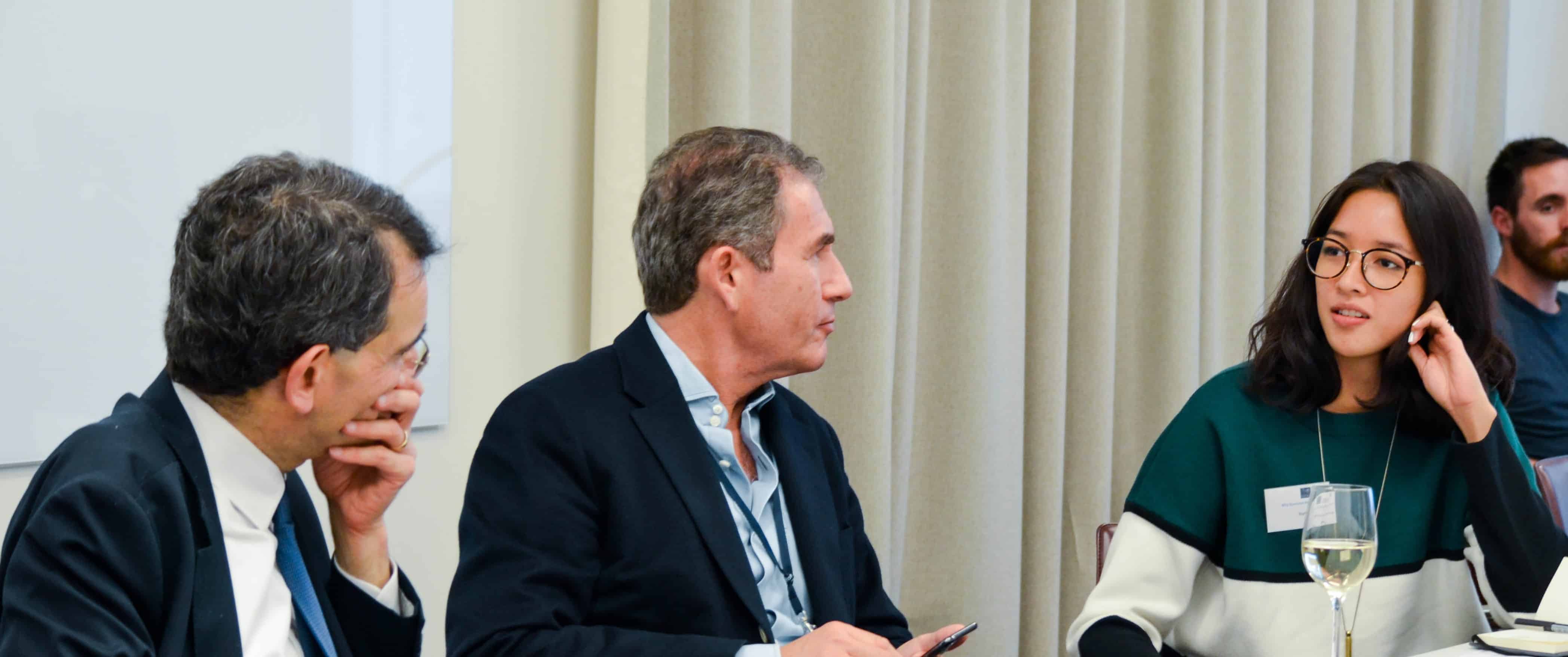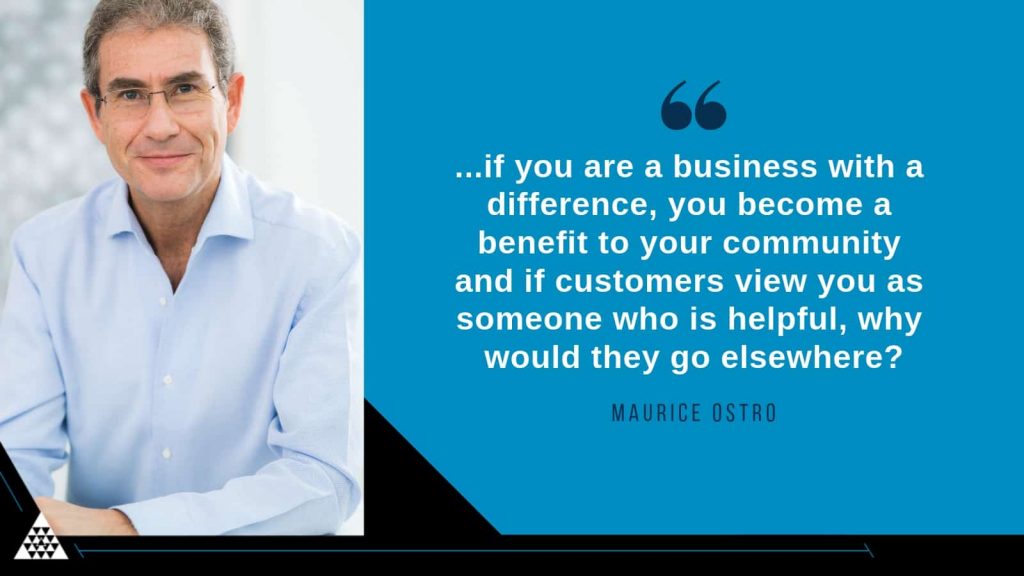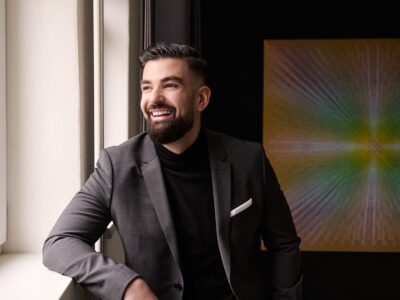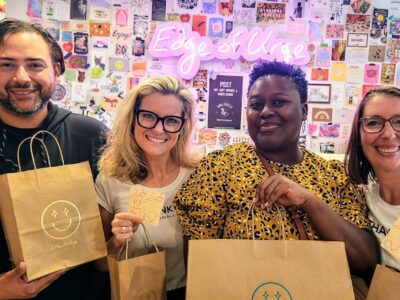On the one hand, Ostro is a successful entrepreneur. His business ventures have ranged from frozen yogurt to gemstones, media distribution and airline catering. On the other hand, Ostro is a philanthropist. He has also been a mentor to London’s Metropolitan Police, and an adviser to London’s mayor as well as to British prime ministers. He founded the Fayre Share Foundation with his wife Katy, serves as Vice Chair of the Council of Christians and Jews and created Collaboration House, a charitable co-working space in London, England, UK. Unlike many of his contemporaries, Ostro has never seen philanthropy and entrepreneurship as being separate elements in business.
“Philanthropy used to be what you did at the end of your life. Look at the Rockefellers and J.P. Morgans of the world,” he explains. “It was not until after they had amassed their fortunes that they began to give back to society to build libraries, hospitals and schools.”
Embracing philanthropy within business has been Ostro’s mindset his whole career. As the son of a Holocaust survivor, he lives his life knowing never to take what he has for granted and to do good through his businesses from the very outset.
“I believe that business can and should be a force for good.”— – Maurice Ostro, Chairman Ostro Minerals (UK) and Fayre Share Investments
Being driven by the belief that the highest form of charity is found in creating business and developing opportunities for people, Ostro shared his gains by giving anonymously to charities. One day, an employee at his company was looking for a few hundred pounds of sponsorship.
“I realized that my employees did not know that 10 percent of the company belonged to a charitable foundation. It dawned on me that modesty is all very well, but I was depriving them of the fulfillment of knowing that 10 percent of their time was going to make a positive difference to others besides the shareholders. If they knew, they would’ve been delighted and created a happier and more productive work force, which in turn would make the business more successful and the charity benefit even more.”
A motivational momentum in business
This shift in thinking for Ostro was a wake-up call for how he needed to connect his business and charitable work. It also made him realize that the way business has been done for decades was not going to survive the generational shift sweeping across the globe.
Millennials will more than likely be the first generation that will not surpass their parents’ standard of living. “Their purpose is not just accumulating wealth. It’s about solving the real problems the world is facing now from climate change to exploitation of workers.”
The age-old business model of accumulating profit and waiting to “give back” later is just not going to work for today’s business leaders or their customers. “Consumers are voting with their wallets, choosing whether to buy the regular coffee or the fair-trade coffee. For entrepreneurs, this is a massive opportunity. Because if you are a business with a difference, you become a benefit to your community and if customers view you as someone who is helpful, why would they go elsewhere?”
Purpose alongside profit
In founding eg, Ostro is not trying to reach philanthropists or even the charitable minded but rather entrepreneurs who are ambitious and aggressive. “If they embed purpose in their company from the start, the business will be more successful. If you want to hire the best caliber of staff, as committed as possible to your company, there has to be a purpose, not just a paycheck.”
Consumer data shows that purpose-driven companies evolve faster than others and can be more profitable. Ostro points to Unilever and its former CEO, Paul Polman, as an example of a leader who understands that when brands are more purposeful, consumers are more loyal. In the long run, these types of businesses will outlast companies who don’t produce purpose-driven products and campaigns.
Entrepreneurs are busy people whose focus is on growth and not charity. Through eg, Ostro gives them the tools to make a positive impact while focusing on their main priority, the success of their company. In that way, a culture of purpose will be rooted in the firm from the very start, which will have a long-term benefit for society. “I believe that business can and should be a force for good.” He’s also engaging his peers within YPO with his purpose-led business mindset. In 1991, at the age of 26, Ostro joined the YPO London Chapter. He is also a member of the YPO Leadership Development Network. This familiarity with the YPO model has inspired him to work with his fellow YPO members, to be better leaders and show how business can tackle the larger challenges in our world. “As YPO members, we can be an example (hence the campaign is called eg) with the decisions we make every minute of every day within our businesses. We need to think about how we can make a positive impact on people and the planet and be a force for good. The opportunity in doing so is massive.” This week, Ostro will be leading Profit with Purpose: A New Global Model, a forum of YPO members in Davos, Switzerland. Each will be challenged to bring one idea to the table of how governments, NGOs and corporations can empower entrepreneurs to become engines of positive social impact. It’s an extension of what eg and Ostro have been doing across the globe by creating communities of purpose-led entrepreneurs and YPO members together to provide mentorship, fresh ideas and the tools they need to create and grow sustainable businesses. “YPO founder Ray Hickok’s vision is living out today as members are engaging within their communities to lead and mentor the next generation of leaders,” says Ostro. “We’ve become an extension of support for entrepreneurs who may not yet meet the qualifications of membership, but undoubtedly benefit from our shared learning.” Ostro’s hope for the future is that business will not contribute to the problems of our world but that it will contribute to solving them.
Bringing YPO members to the table




